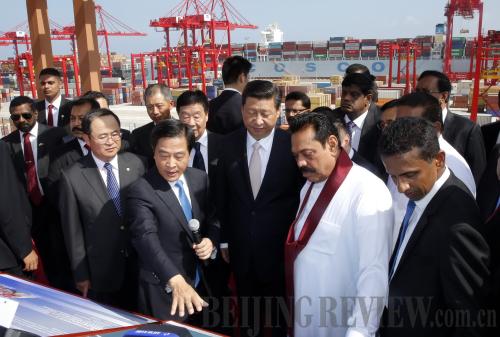|
 |
|
SYMBOL OF COOPERATION: Chinese President Xi Jinping (third right) and his Sri Lankan counterpart Mahinda Rajapaksa (second right) visit a China-invested container terminal in Colombo on September 17 (JU PENG) |
Zhao Ruiqi, an associate professor at the Beijing-based Communication University of China, said that Modi's ambition to stage India's economic takeoff needs China's help.
"As there are big differences among them, it's hard for other Indian states to replicate Gujarat's economic success story during Modi's tenure as its chief minister from 2001 to 2014. The takeoff of the Indian economy requires cooperation with foreign economic powerhouses," Zhao said. "Modi, who is known as a pragmatist and values China's development experiences, naturally will not overlook opportunities to approach China."
Professor Kishore Mahbubani, an Indian-Singaporean scholar and Dean of the Lee Kuan Yew School of Public Policy at the National University of Singapore, believes one factor will determine how soon India can become the world's number two economy in purchasing power parity (PPP) terms—Will India work with or against China in its promising century?
In an article recently published on the website of the Mumbai-based think tank Gateway House, Mahbubani wrote, "Since India has already overtaken Japan to become the number three economy in the world, there is no reason why India cannot become number two in PPP terms…If it works with China, it will become number two much faster as there are many synergies in the relationship that can be exploited."
Despite border disputes and security problems left by history, Fu Xiaoqiang, a researcher with the China Institutes of Contemporary International Relations (CICIR), believes that China and India are placing each other in a more prominent position of their foreign strategies, maximizing common ground and minimizing differences. "The two countries are accumulating strategic mutual trust by strengthening cooperation in fields such as the economy and culture to pave the way for the final settlement of their differences," Fu said.
There are also an increasing number of voices in India calling for border disputes to be shelved and seeking common interests between China and India. Many scholars claim that due to the various political, geographic and historical factors, it is not easy to find a quick-fix solution to border issues, but the two sides can focus on common development in the meantime.
In an interview with Shanghai-based news website The Paper, Swaran Singh, a professor at the School of International Studies at Jawaharlal Nehru University, said India and China could gradually give up their fixed positions to resolve border issues in the light of development.
During Xi's trip, The two sides also agreed that before border issues are eventually solved, joint efforts should be made to manage and control their disputes in a proper way and maintain peace and tranquility in the border regions.
Modi said that India is willing to work with China on border issues, advance their negotiations and find a solution at an early date. He also reiterated that India will not allow Tibetans to conduct anti-China political activities in the country.
In addition, the two Asian neighbors agreed on China's investment in India's railways and industrial parks, as well as measures to address their trade imbalance. China announced the target to increase its investment in Indian industrial and infrastructure projects to $20 billion in the next five years. The two sides agreed on cooperation to lift India's train speed and jointly explore the ways to upgrade railway stations and develop high-speed railways in the country. The existing Chennai-Bangalore-Mysore railway line will be among the first to have the train speed increased, and the two countries will also launch training programs in heavy-haul transportation. Meanwhile, China promised to import more Indian pharmaceuticals and agricultural products that sell well in China in a bid to balance bilateral trade.
To further promote the two countries' religious exchanges, the Chinese side announced the opening of a new route for Indian pilgrims to China's Tibet Autonomous Region, for which the Indian side expressed its welcome and appreciation.
| 